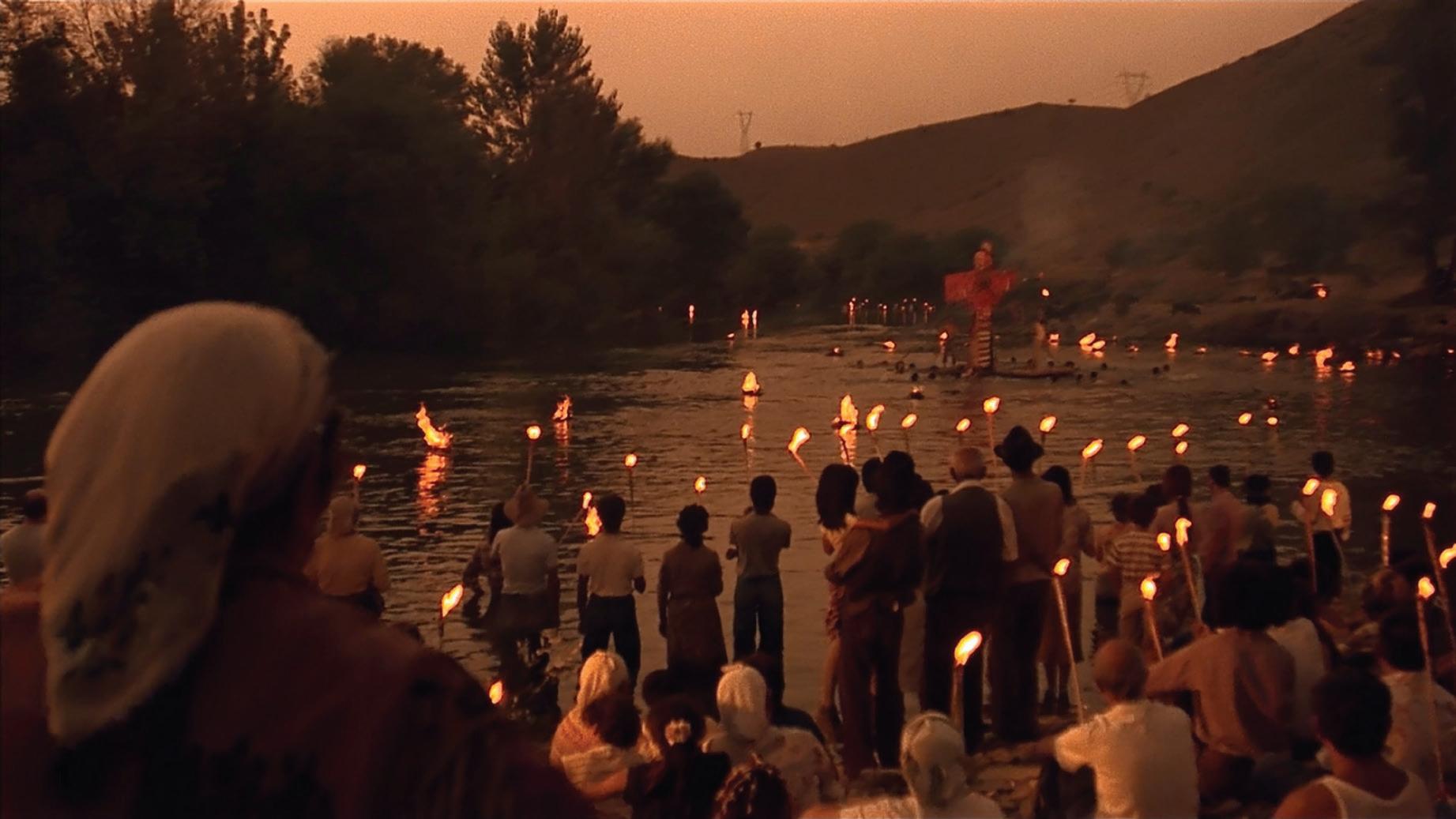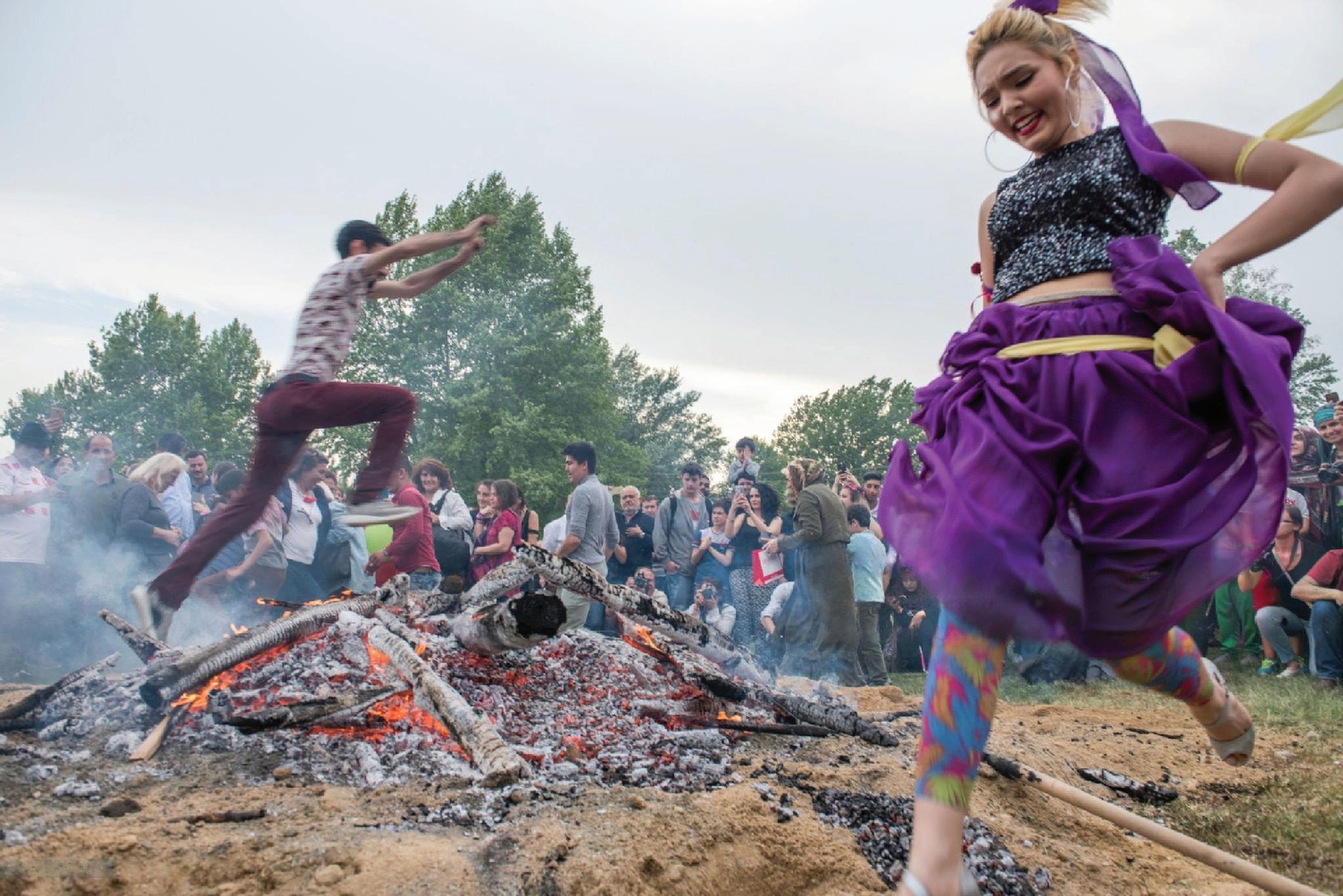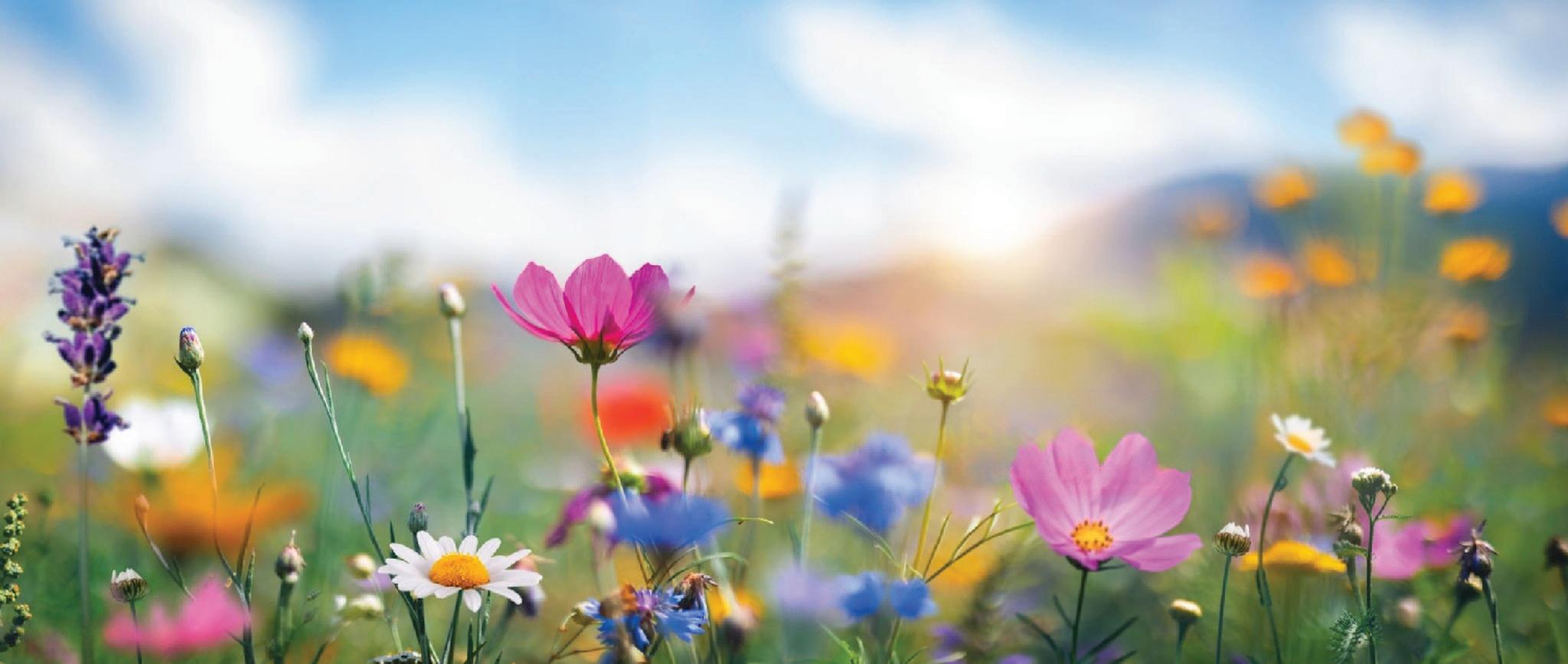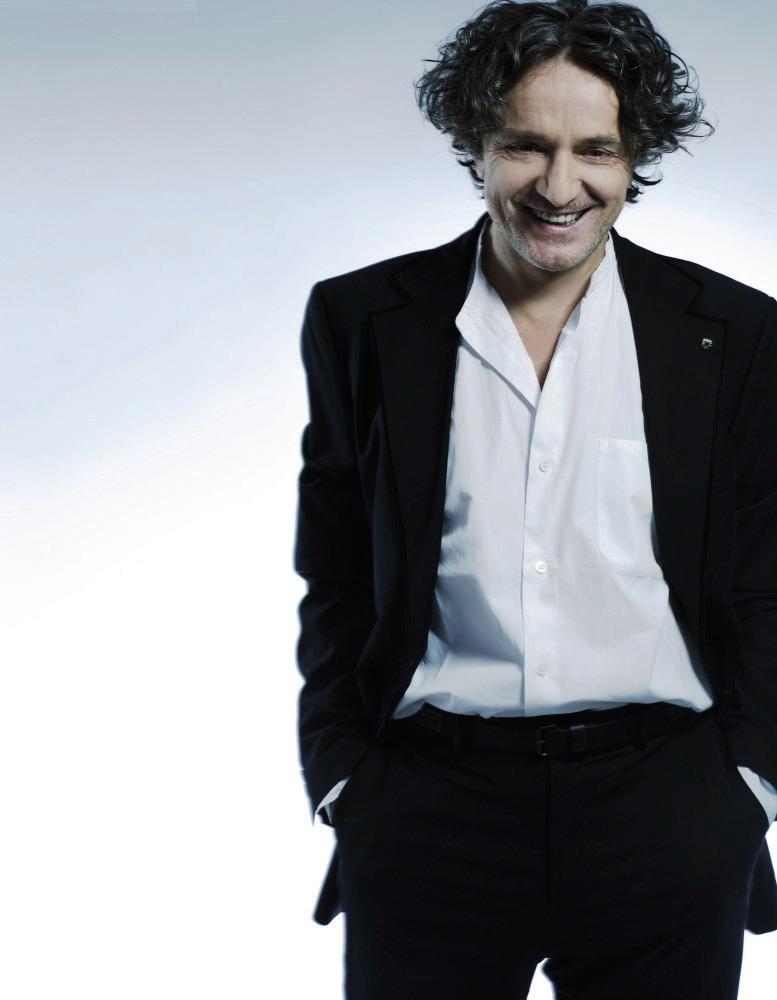
8 minute read
EDERLEZI
The spring celebration of the Roma community
by Emma Strocchi
Sa o Roma, babo, e bakren čhinen
A , odo, daje, amaro dive
A maro dive, Ederlezi
E devado, babo, amenge bakro
S a o Roma, babo, e bakren čhinen
I. Ederlezi: spring, Easter and religion
The Roma community places great significance on the arrival of spring, marked by a lively celebration known as Ederlezi, a feast characterised by music, dance, rituals and plenty of food.
E derlezi is the Romani word for Đurđevdan, the George’s Day, a Serbian festivity for the celebration of saint George, one of the most important saints in the Balkans. The Serbian term originally comes from the Turkish Hidirellez, the celebration of the rebirth of nature and the return of spring.
Ederlezi festivities are embraced by the Roma community worldwide, irrespective of their religious affiliations, whether they are Catholic, Orthodox or Muslim. Saint George’s Day is traditionally observed on April 23rd, commemorating his death, but in the Julian calendar followed by Orthodox adherents, this date corresponds to May 6th in the Gregorian calendar. However, if April 23rd falls during Holy Week, the Saint George celebration is postponed by a few days. Being Ederlezi the celebration of spring and fertility, what better time to celebrate it than spring itself? Ederlezi shares a close connection with Easter and is often considered a secondary Easter within Roma communities, which hold a deep reverence for religious observances – particularly Easter, the Assumption of the Virgin Mary on August 15th and Christmas.
II. Celebration
E derlezi starts in the morning with the participation in the mass in the church to celebrate saint George. As the day progresses, community members either gather or purchase flowers to beautifully decorate their dinner tables for the grand family feast that will occur in the evening, echoing a tradition similar to Easter observed by the wider Greek community. Every year, a person from the family is chosen to host Ederlezi in their house and so to welcome all the members of their family. Stavros, one member of the Roma community of Dendropotamos, says that “During Ederlezi all Roma celebrate with food, play a lot of music and sing the Ederlezi song. Dinner is only with family members: the family is very important for the Roma, because society didn’t accept them, so all the social relationship were only among and between the Roma families”.
A s for the 15th August, on the occasion of Ederlezi the communities slaughter and cook lambs. These lambs are sacrificed at midnight on the preceding night by a designated individual, and their meat is prepared for the festive dinner. The head of the lamb is then served in a big plate accompanied by some traditional food, while the body is filled with rice, liver and vegetables and is baked. The two other main dishes are pilafi (rice with lamb) and souisi (a spicy tomato soup with lamb) and is common to drink white wine, known as krasi in Greek and mol in Romani. After the meal, the big party continues with music, wine and dances throughout the night until sunrise. During the night, the Roma girls put some pieces of their jewellery all together in a bowl filled with water and flowers. The bowl is then covered with a cloth and from there they will blindly pick the jewellery and take them out of the water: the girl to whom the jewel belongs will be dedicated the next song and will have to dance to it. The song’s lyrics, if not already indicating a part of the girl’s past, are believed to foreshadow her future. After the dancing, the community makes some fires that the couples will have to cross by jumping – “so everybody understands who is in love with whom”, as recounted by Stavros’ grandmother.

During Ederlezi all Roma celebrate with food, play a lot of music and sing the Ederlezi song. Dinner is only with family members: the family is very important for the Roma, because society didn’t accept them, so all the social relationship were only among and between the Roma families.
Another traditional ritual for the celebration of Ederlezi is burning flowers in bowls and releasing them to float down a river. While this practice is now primarily observed by some Muslim Roma, especially along the Nestos river, it remains symbolic of purification, the defiance of death and the renewal of nature, marked by the use of water, flowers and fire.
III. Symbology and meanings
The blood of the lamb holds a significant role in Ederlezi celebrations as it is employed to trace a cross on the foreheads of family members, bestowing a sense of blessing due to its association with Christianity. Immediately following the lamb’s sacrifice on the night preceding Ederlezi, the Roma collect the blood in a vessel called thimiato and perform the sign of the cross three times. Subsequently, this blood is used to mark crosses on the foreheads of all family members, conveying blessings and wishes for their well-being.

The killing of the animal also serves as a sacrifice to saint George: the community makes a promise (tama in Greek) to the saint and sacrifices the lamb in his honour. Celebrations centred around the rebirth of spring often find their roots in pagan traditions, echoing the practice of animal sacrifice in ancient rituals. For instance, in ancient Greece, sacrificing animals to the gods was a common practice during various occasions, a tradition that has endured through time.
The sacrifice of the lamb is also strictly connected to Judaism. In the book of Exodus, the Hebrews protect their children from the slaughter of all the first-born sons of Egypt, willed by God, by drawing on their doors a cross with the blood of a lamb sacrificed to the divinity. These events will then state the beginning of the Hebrew Easter.
Given that the core of the celebration revolves around sacrifice and new beginnings, the principal colours of the festivity are red and white. Red symbolises the lamb’s blood and the act of sacrifice, while white signifies purity, rebirth and refers to the animal itself, embodying an essence of renewal.
Turning from colours to spring, what relevance does the latter have in the Romani world? In Stavros’ words:
Ederlezi is the celebration of spring and spring is very important for Roma, because they are travellers and don’t have a home. When the flowers from the beautiful earth grow up during spring, Roma can stay outside of their houses because of the good weather and go to work at the flea market. This is why spring is related to panigiri.
Plenty of flowers decorate the tables in order to celebrate the arrival of the spring and hence the start of the good season for the Roma people. In fact, spring and summer are the times when the Roma can most easily work and save money for the following months.
The celebration of spring is accompanied by the traditional song Ederlezi, made famous by the performance of Bosnian musician Goran Bregović. Apart from the version in Romani, there is also a version of the song in Greek, which is slightly different from the one in Romani.
Romani
Sa o Roma, babo, e bakren čhinen
Ame, čoro, dural bešava
A, odo, daje, amaro dive
Amaro dive, Ederlezi
Edevado, babo, amenge bakro
Sa o Roma, babo, e bakren čhinen
Ej, sa o Roma, babo, babo
Sa o Roma, o daje
Sa o Roma, babo, babo
Ej, Ederlezi, Ederlezi
Sa o Roma, daje...
Ej, sa o Roma, babo, babo
Sa o Roma, o daje
Sa o Roma, babo, babo
Ej, Ederlezi, Ederlezi
Sa o Roma, daje...
A, odo, daje, amaro dive
Amaro dive, Ederlezi
Edevado, babo, amenge bakro
Sa o Roma, babo, e bakren čhinen
Ej, sa o Roma, babo, babo
Sa o Roma, o daje
Sa o Roma, babo, babo
Ej, Ederlezi, Ederlezi
Sa o Roma, daje...
Ej, sa o Roma, babo, babo
Sa o Roma, o daje
Sa o Roma, babo, babo
Ej, Ederlezi, Ederlezi
Sa o Roma, daje...
Ederlezi, sa o Roma, daje...

English
All my friends dance the oro
Dance the oro, they make the day
All the Roma, mummy
All the Roma, dad, dad
All the Roma, o mummy
All the Roma, dad, dad
Ederlezi, Ederlezi
All the Roma, mummy
All the Roma, dad, sacrifice sheep
But me, poor drummer, I must stay away
ARomani day, our day
Our day, Ederlezi
Dad, a sheep for us
All the Roma, dad, sacrifice sheep
All the Roma, dad, dad
All the Roma, oh mummy
All the Roma, dad, dad
Ederlezi, Ederlezi
All the Roma, mummy
Greek
Όλοι οι φίλοι μου χορεύουν το “όρο”
Χορεύουν το oro, γιορτάζουν τη μέρα
Όλοι οι Ρομά, μαμά
Όλοι οι Ρομά, μπαμπά, μπαμπά
Όλοι οι Ρομά, ο μαμά
Όλοι οι Ρομά, μπαμπά, μπαμπά
Εντερλέζι, Εντερλέζι
Όλοι οι Ρομά, μαμά
Όλοι οι Ρομά, μπαμπά, αρνιά σφαγή
Α λλά εγώ ο φτωχός κάθομαι χώρια
Μια ημέρα των Ρομά, η ημέρα μας
Η μέρα μας, Ederlezi
Δίνουν, μπαμπά, ένα αρνί για εμάς
Όλοι οι Ρομά, μπαμπά, αρνιά για σφαγή
Όλοι οι Ρομά, μπαμπά, μπαμπά
Όλοι οι Ρομά, ο μαμά
Όλοι οι Ρομά, μπαμπά, μπαμπά
Εντερλέζι, Εντερλέζι
Όλοι οι Ρομά, μαμά
The family and the dances, the food and the sacrifice, the music and the celebration of saint George, the flowers, the fires, the holy cross. This is the Roma spring, the celebration of the rebirth of nature. This is Ederlezi.










